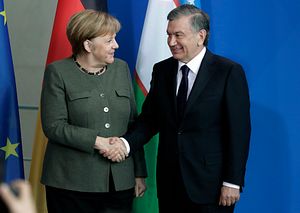From January 20 to 22, Uzbek President Shavkat Mirziyoyev made an official visit to Germany. The visit can be seen as another step back into the international arena for Uzbekistan as well as a specific bid on the part of Tashkent to attract Berlin’s businesspeople.
Ahead of the visit, on January 15, German citizens were granted the ability to travel to Uzbekistan visa-free for up to 30 days. The rest of the European Union (besides France, which got visa-free access last year), is scheduled to join the visa-free list on February 1. In addition, during a German-Uzbek business forum in Berlin on January 14, Deputy Prime Minister Sukhrob Holmuradov said that 4 billion euro ($4.56 billion) worth of “protocols of intent” and investment contracts has been signed.
Mirziyoyev’s visit to Germany included its own bevy of signed agreements, reportedly nine intergovernmental and interagency documents related to the economy, trade, finances, education, science, and innovations.
German Chancellor Angela Merkel said Germany wants to be “Uzbekistan’s reliable partner.”
“We see a lot of opportunities to expand ties between our countries,” she said after talks with Mirziyoyev.
Mirziyoyev said he wanted to bring relations with Germany to “a tangibly new and higher level.” He stated a desire to grow bilateral trade from 700 million euros to 1 billion euros.
German-Uzbek relations have significant roots, reaching back to a fundamentally economic foundation on which the relationship was built following the collapse of the Soviet Union. As Bernardo Teles Fazendeiro notes in a chapter devoted to German-Uzbek relations under Uzbek President Islam Karimov, Uzbekistan’s first president admired the German economic model and German leadership of the time took to heart Tashkent’s endorsement of regional stability.
While in the wake of the 2005 Andijan massacre, the European Union imposed an arms embargo and visa bans on Uzbekistan, Germany was at the forefront of rolling back those measures. Visa bans on several Uzbek officials were lifted in 2008 just ahead of an official visit by then-head of the Uzbek National Security Service (SNB) Rustam Inoyatov to Germany.
In certain ways, German pressure on Uzbekistan was hindered by the same concerns that let Uzbekistan escape sanction by the United States after 2005. From 2002 to 2013, Germany used the Termez airbase in Uzbekistan to supply its forces in Afghanistan. From 2001 to 2005, the United States had used another Uzbek airbase, Karshi-Khanabad (K2). In 2005, the U.S. was pushed out of K2, but the Germans remained at Termez.
While acknowledging some of the positive measures taken by the Mirziyoyev regime, many continue to caution states like Germany to not give in on human rights concerns too soon. As Human Rights Watch’s Europe and Central Asia Director Hugh Williamson noted in a commentary ahead of Mirziyoyev’s visit to Germany, “The positive changes in Uzbekistan are from a very low base.”
Williamson astutely points out that businesses have a role to play in helping Uzbekistan further its reform efforts while also paying attention to human rights issues. “Companies that see new openings would do well to insist on universal standards that respect human rights and make long term business sense, such as no forced labor, no cooperation with abusive government entities, and respect for labor rights,” he wrote.
As Uzbekistan goes full throttle on efforts to attract investment, there will be tension between the immediate rewards of signing deals and the longer term difficulties in rewiring how Uzbekistan does business. Germany has both an opportunity and a responsibility, in the eyes of rights advocates, to help nudge Uzbekistan along a positive path.

































